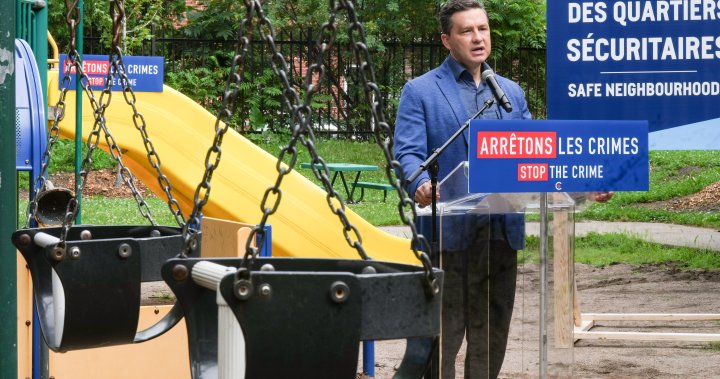Poilievre calls supervised consumption sites ‘drug dens’, vows to shut some down

Conservative leader Pierre Poilievre Friday referred to supervised consumption sites as “drug dens” and promised to shut down some of the sites if he was elected premier – a proposal the British Columbia premier called a “real mistake.”
Poilievre also said a Conservative government would cut federal funding for such operations.
“We will close safe injection sites near schools, playgrounds and any other place where they put the public at risk,” Poilievre told reporters at a news conference.

He held the event at a playground in southwest Montreal, near a transitional housing project that also includes a supervised consumption site, which has been a source of controversy in the community.
“We are going to defund them. The Poilievre government will not invest a single cent in drug dens. Every cent will be spent on treatment and recovery services, to get our loved ones home drug-free,” Poilievre said.
The Conservative leader criticized the riding’s Liberal MP, Marc Miller, for “doing nothing” to address public safety concerns.
Poilievre recently occupied several events in Montreal as the party attempts to make inroads into the city, particularly in the Liberal Bastion of Mount Royal owned by Anthony Housefather.

The first supervised consumption site opened in Vancouver 20 years ago, and there are now 39 across the country, according to Health Canada. Health authorities across the country also operate temporary overdose prevention sites that don’t offer the same support services as supervised consumption sites.
British Columbia Premier David Eby defended supervised consumption sites when asked about Poilievre’s comments Friday, telling reporters in Burnaby that closing them would also lead to more open and dangerous drug use.
The email you need for the day
The top news from Canada and around the world.
“These sites are one of the mechanisms that allow people to connect to the system and get into treatment,” he said. “It also allows people to stay alive and avoid using drugs at the entrances of businesses, in parks and on the street.”
“I hope I can convince any administration that closing these sites would be a real mistake.”
Poilievre criticized Eby’s NDP government and the federal Liberals for launching a three-year pilot project in British Columbia last year to decriminalize possession of small amounts of hard drugs. The province partially scrapped the program in the spring to combat rising drug use in public places.
Eby and his government were also forced this week to disavow A report by Dr. Bonnie Henry, Quebec’s public health official and a critic of drug prohibition policies, which proposed making “safe” alternatives to opioids and other illicit drugs available without a prescription. The Conservatives sought to tie the report to Eby and Prime Minister Justin Trudeau, despite Henry’s independence from the government.
Drug addiction researchers said A multi-pronged approach that includes safe consumption sites, decriminalization, regulated drug supply and treatment is the best way to address the overdose crisis and combat the use of deadly opioids like fentanyl. Researchers and advocates have also linked the rise in public drug use to the growing housing and homelessness crises.
According to Health Canada, the goal of supervised consumption sites is to prevent overdose deaths and the spread of infections such as HIV and hepatitis C, as well as to provide medical care and Mental Health support.
A 2011 Supreme Court decision said closing the first Vancouver operation would violate Charter rights.
But Poilievre said that means sites can operate anywhere without “reasonable restrictions.”

The Conservative leader also pledged to make it more difficult to open supervised consumption sites, which must obtain an exemption from the federal government under the Controlled Drugs and Substances Act to operate.
“We have the authority under section 56.1 of the Controlled Drugs and Substances Act to reject these drug dens and shut them down when they are putting the public at risk and that is what I will do,” Poilievre said.
Since 2016, there have been more than 44,000 opioidCOVID-19 deaths in Canada.
Garth Mullins of the Vancouver-area drug rights group says the potential closure of these sites will only lead to more fatal overdoses.
“I’m an expert because I’ve been through this experience. I was doing heroin before there were safe injection sites and sometimes I did it in public so that if I overdosed or fell, someone could call 911,” Mullins said.
He said Poilievre should consider opening more supervised consumption sites, rather than threatening to cut them. He also accused Poilievre of having no concrete plan.
“It’s a beautiful dream, the dream of a world without drugs, but it’s also very naive. They have no answer to the toxic drug crisis. They have no solution for the thousands of deaths,” Mullins said.
— with documents from The Canadian Press
© 2024 Global News, a division of Corus Entertainment Inc.



















